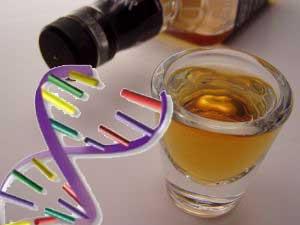Scientists find genetic link to subjective alcohol effects

Overview
Originally Published: 05/30/2011
Post Date: 05/30/2011
Attachment Files
Addiction Genetics Article | Scientists find genetic link to subjective alcohol effects
Summary/Abstract
Most people are aware that people are at a higher risk of suffering from alcoholism when they have a close relative who also has alcohol problems. However, no one has been able to shed some light on this issue... until now.
Content
Most people are aware that people are at a higher risk of suffering from alcoholism when they have a close relative who also has alcohol problems. However, no one has been able to shed some light on this issue... until now. Researchers at the University of Gothenburg in Sweden have found that people who have a close relative who is an alcoholic react more positively to alcohol than other people. Published in the journal Alcoholism: Clinical & Experimental Research, the study focused on a large group of people who have a close relative with type I alcoholism. Most studies in the past investigated more limited populations such as sons of alcoholic fathers. Scientists have identified two types of alcoholism: type I and type II. The first one is contingent on the interaction of genetic factors with the environment. The link between social environment and life events is one example. Type II, meanwhile, is based on a large genetic risk of developing an addiction to alcohol, independent of environment. 'The study is unique in the way in which we have studied how children of type I alcoholics experience the effects of alcohol and compared this with the experiences of the control group, which consisted of people who had no history of alcohol abuse in the family,' says Dr Anna Söderpalm-Gordh from the Addiction Biology Unit, Institute of Neuroscience and Physiology at Sahlgrenska Academy of the University of Gothenburg. 'The group of people who were children of type I alcoholics were healthy and had no mental health problems, and they did not have alcohol problems themselves.' For the purposes of their study, the researchers gave moderate amounts of either alcohol or placebo in the form of juice to a group of 51 participants (34 men and 17 women). No selection process was used to determine who got what; the drinks were given at random. The breakdown showed that 29 participants were part of the control group and 22 were members of the group for whom a member of the family had type I alcoholism. The researchers then asked members from both groups to describe how they experienced the effects of the alcohol. Their data showed that participants with a family member with type I alcoholism reported more positive and more stimulating effects from drinking alcohol than control group members. These participants conveyed their need to drink more alcohol compared to those in the group without any hereditary effects, the researchers said. Thus the findings support the theory that children of type I alcoholics inherit some form of positive experience of drinking alcohol, according to them. 'These results show that some of us are more responsive to the rewarding effects of alcohol: we react to alcohol more strongly and more positively than others,' Dr Söderpalm-Gordh explains. 'This can, in turn, lead to increased consumption and a greater risk of alcohol abuse. The results also suggest that children of type I alcoholics, who have been considered to run a smaller hereditary risk of developing alcohol addiction, may be in the danger zone for developing alcoholism.' The findings are significant, especially since some 40% of the Swedish population has a close family member who has alcohol problems, she says. 'Each person's individual experience of alcohol is an important tool in understanding why certain people develop alcoholism and it may be a marker in itself for how an individual's alcohol consumption may develop,' Dr Söderpalm-Gordh comments. 'Our discovery is part of the preventative work that can help a certain group of people who run the risk of drinking too much alcohol.'





